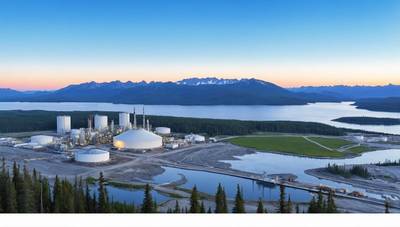Sources say Canada could produce its first LNG this weekend
Two people who are familiar with the launch of the plant said on Wednesday that Canada could produce the first liquefied gas ever this weekend.
This facility will be the only LNG plant in North America that has direct access to the Pacific Coast, reducing the sailing time to Asian markets.
According to the company, when fully operational, it will be able to export 14 millions metric tons per year (mtpa).
"We started cooling down Train 1 Monday. As long as there are no unexpected difficulties, we expect to start producing LNG in six days." One of the people who is familiar with the startup said that we should expect the first LNG between Saturday and Sunday.
LNG Canada informed staff last Friday that the cooling down of Train 1 will continue until Thursday, June 19, and extensive flaring was expected.
LNG Canada announced on Tuesday that the first LNG will be produced by Train 1 and that LNG cargoes should arrive in the middle of 2019.
According to the two sources, only a part of the plant will be operational this weekend.
One of two sources said that Train 1, which has a production capacity of 6.5mtpa or half the total output from LNG Canada, is experiencing problems with one of its lines. It will only be able to produce at half capacity until the problem can be resolved.
LNG Canada has not commented on the production issues.
According to LSEG's ship tracking data, the LNG tanker Gaslog Glasgow has departed for LNG Canada's Kitimat Port. According to the people, the vessel is expected on June 29th and will be filled with LNG.
Seven years have passed since Shell Plc, Petronas, PetroChina and Mitsubishi Corporation approved the financial progress of the project.
Traders said that once LNG Canada is in service, Canadian gas will export to the U.S. may decline. Canadian energy companies will have another outlet to sell their fuel, and will likely sell more to countries other than the U.S. The U.S. remains the sole outlet for Canadian natural gas.
According to U.S. Energy Information Administration data, Canada will export about 8.6 billion cubic foot per day (bcfd), up from 8.0 bcfd a year ago and 7.5 bcfd on average over the previous five years (2018-2022). This compares to a record of 10.4 bcfd set in 2002. Reporting by Curtis Williams, Houston; Editing by David Evans
(source: Reuters)


